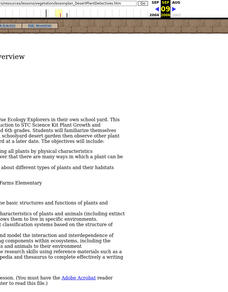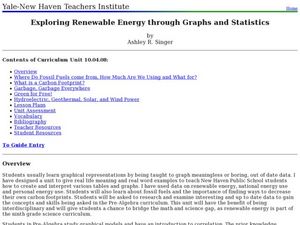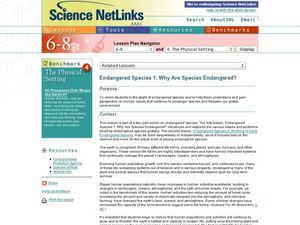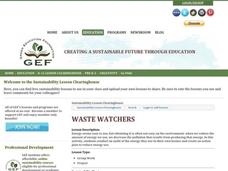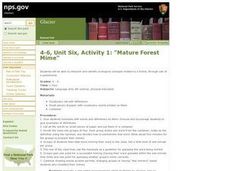Curated OER
Bird Ecology Unit
Birds, plants, and vegetation, is there anything more lovely? There is! Engage your class in the scientific process, data collection, and data analysis. They stroll their campus observing and identifying various birds and plants,...
Curated OER
Rapa River Watch
Assess the risk of introducing a non-native species of snail to four different estuaries. Lab groups conduct research as habitat evaluation and present their conclusions to the class. The resource has a comprehensive booklet containing...
Curated OER
Ecology Explorers
Students create accurate, detailed map showing physical features, plants and trees, and other details of three school sites.
Curated OER
Ecology
Learners explore, experience and experiment identifying the human impact on the environment of vegetative differences within the same biome. They assess what causes deserts, rain forests, savannahs, tundras and saguaros and how these...
Curated OER
Desert Plant Detectives
Students examine and categorize plants in their own schoolyard desert garden and then observe other plant areas of their schoolyard.
Curated OER
Wetland vs. Stream Macroinvertebrates
A link to a comprehensive macroinvertebrate guide gives you the information needed to prepare for this field study activity. Sample macroinvertebrates are collected from areas representing different environmental conditions. Junior...
Curated OER
Growing Vegetable Soup
Students use children's literature in order to think about the concept of creating a garden. This is done through conducting simple research about types of plants that could be grown in the area and how to care for them. Then the garden...
Curated OER
Investigative Case - "Malama Keone'o'io"
Students study techniques for conducting a local environmental assessment in an ecologically sensitive area. Identification of native plants and methodologies for sampling is taught in the classroom and then reinforced in the field. The...
Curated OER
Exploring Renewable Energy Through Graphs and Statistics
Ninth graders identify different sources of renewable and nonrenewable energy. For this math lesson, learners calculate their own carbon footprint based on the carbon dioxide they create daily. They use statistics to analyze data on...
Education Outside
Our Water Planet
Fresh water is a precious resource. Most kids don't realize how little of the water on Earth is actually drinkable. This lesson will help to illuminate them on this important topic. They discus the ratio of water to land, where most...
Environmental Protection Agency (EPA)
Word Scramble
Practice vocabulary and key concepts in the basics of water conservation with a quick online fill-in-the-blank word scramble. Use the context of the sentence and the scrambled word to determine the correct word to complete the concept.
Curated OER
Endangered Species 1: Why are Species Endangered?
Emerging ecologists examine endangered species by visiting the US Environmental Protection Agency website. They consider human contribution to the decline of different species. They research an endangered animal and then craft a poster...
Curated OER
Research Projects in Renewable Energy for High School Students
Thirty-eight pages of information prepares you to assign middle or high schoolers a project on sustainable energy. They take a pretest, review the scientific method, conduct background research, and finally choose an experiment to carry...
Curated OER
Waste Watchers
Energy-aware learners conduct an audit on their electricity usage by recording their electric meter reading and assessing the thermostat, light bulbs, windows, and water heaters in their homes. In class, they analyze results and discuss...
Curated OER
Who Owns Water
Students role play how water is allocated to different holders of water rights. In this ecology lesson plan, students identify the different water rights available. They explore problems associated with water use including drought,...
Curated OER
Decision Making a Mock Town Meeting on a Proposed Tank Farm
Students identify the potential hazards to the water supply. In this ecology instructional activity, students role play a town hall meeting to discuss the proposal of a storage tank construction in their place. They present their...
Curated OER
Mature Forest Mime
Students come to understand vocabulary words through pantomime. In this vocabulary lesson, students first review several vocabulary words and their meaning, then they work in groups to pantomime the definitions.
Curated OER
HABITAT for the other 90%
Learners examine the connection between the habitat needs of endemic species to the habitat needs of humans. In this habitat instructional activity students research the habitat requirements of a given family then develop an idea to...
Curated OER
The Great Pond Safari
Students study pond life by visiting a pond and completing an associated worksheet. They play an online game based on the pond learning experience.
Curated OER
Plants, Ecology, Seed Planting
First graders use senses to examine objective or events, then gather and interpret data with instruments. They design invention to support or refute hypothesis, then generate, record, and organize data. They improve environmental...
Curated OER
What is Urban Ecology?
Here is a worksheet on Urban Ecology in the state of Arizona. In it, learners answer nine short-answer questions on this topic. The last two questions have them use the reverse side of the paper to create tables and graphs which deal...
Curated OER
Ecology
For use early in the year with your ecology class, this collection of slides introduces viewers to cycles in nature and relationships between organisms. There is a food web diagram, but the presentation is incomplete without any diagrams...
Curated OER
You Are What You Drink!
Students explore water treatment systems. In this water conservation ecology lesson, students identify and explain several processes used for water treatment and define related vocabulary after listening to content information given...
Curated OER
Around-The-World-Zoo
Junior biologists design and maintain a website about a zoo by researching, classifying, and providing the correct habitats for the animals they choose to have in their zoo. This technology-based project can last over an entire semester...






